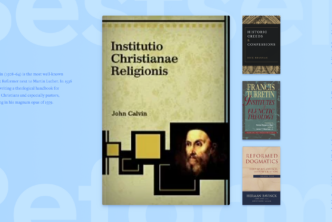We’re excited to share that Surprised by the Parables by Michelle Lee-Barnewall (available now from Lexham Press) was named a finalist for a 2021 Christian Book Award! The book walks through nine of Jesus’ parables to help readers see them in a new, transforming light.
The following excerpt from Surprised by the Parables explains what’s really happening in Luke 7:36–50 as Jesus reveals the true nature of grace and forgiveness.
Jesus relates this brief parable in an interaction with Simon the Pharisee. The whole story begins with Simon’s invitation for Jesus to dine with him at his home. There could have been various occasions for this. One possibility is that Jesus had been preaching in the local synagogue, after which the Pharisee had invited him over for the Sabbath meal.1 Others have proposed the meal is patterned after the Greek symposia, which were drinking parties that followed a banquet and were characterized by lively conversation and perhaps even debate.2 Whatever the occasion, there would have been certain expectations for hospitality from Simon as the host. As a Pharisee, he would also have been obligated to maintain certain conventions of ritual purity.3
At some point during the meal, a woman who is known to have lived a sinful life enters. As she stands behind Jesus, weeping, she wets his feet with her tears and then wipes them with her hair, kisses them, and pours perfume on them.
Simon is shocked that Jesus is allowing this. Although he respectfully addresses him with the title “teacher” (Luke 7:40), Jesus’ actions cause Simon to doubt him. He thinks that if Jesus were really a prophet, he would know “who and what sort of woman” was touching him, with the implication that he would not allow that to happen. In response, Jesus tells the parable of the two debtors.4
The parable itself is quite simple. Two men owe money to a moneylender. One has a large debt—five hundred denarii, or about a year-and-a-half’s wages.5 The other’s debt is substantially smaller, only fifty denarii. Both have their debts canceled. Jesus’ question is straightforward: Given how much each has been forgiven, who will love the moneylender more?
Simon would have been familiar with the Roman customs concerning debt and obligation. However, Jesus turns the ancient system upside down by saying the woman’s action should not be understood as repaying a debt as much as coming from love that results from having the debts canceled.6
Simon answers Jesus’ question about which debtor will love the creditor more by saying “the one who had the bigger debt forgiven.” Jesus tells him he is correct and then applies the lesson of the parable. In contrast to the lavish display of the woman, Simon did not offer him any water to wash his feet or give him a kiss. It is not certain how much would have been required of a host. But whatever the case, Luke clearly shows us Jesus considers what the woman does extraordinary, demonstrating great love and devotion.
Jesus says her sins have been forgiven “as her great love has shown.” Then, in what would be an allusion to Simon, he also gives the flip side, saying, “Whoever has been forgiven little loves little” (Luke 7:47).
Finding the ‘twist’ in the parable
On the one hand, Jesus’ parable and lesson seem straightforward. The woman loves much because she has been forgiven much. The larger the burden lifted, the greater the gratitude. Great sin does not mean one is hopelessly lost, but provides an opportunity for God to demonstrate his abundant grace. One who knows how much one has received loves God in response to what one has been forgiven.
The proposition makes sense. After all, we see Paul’s great devotion to Christ even though he considered himself to have been the “worst” of sinners (1 Tim 1:15). But the story also presents a potential problem: Does one need to sin much in order to love much? Or to put it another way, if one has been “good” and only sins a little, can that person never have great love for Jesus?
I like to tease my students with this thought. Isn’t this a great parable? I tell them. Look at the grace that Jesus gives this woman, someone who was probably shunned and humiliated by everyone else around her. Jesus affirms her in front of everyone and removes her shame. In the classroom, many heads nod. I continue. We want to love Jesus a lot, right? Yes, they readily agree. Well, then according to this parable, we love Jesus the more we’ve been forgiven. But in order to be forgiven a lot, what do we need to do first? Silence. Some students squirm in their chairs. Mostly their faces break into wide grins, and there is muffled laughter.
Finally someone speaks. We need to sin a lot, says the student. Yes, that’s it! I respond. I feign as much enthusiasm as I can. We finally have the answer! Since we want to love Jesus a lot, we need to sin more! Take the whole weekend and sin as much as you can! The more you can sin, the more you’ll love Jesus! Just remember to ask for forgiveness. Isn’t this great?
By this point, the students can see what I am doing and start to protest. So we talk about the parable. What could Jesus mean? The answer, I tell them, lies in recognizing how this would be heard by Simon the Pharisee.
Simon’s response
In many ways, Simon’s response to the woman would not have been surprising in the cultural context. Her presence would have been automatically objectionable, particularly for a Pharisee such as he. That she is described as someone known in the town as a sinner “marks her as a prostitute by vocation, a whore by social status, contagious in her impurity.”7 As a Pharisee, Simon would have had a great concern for purity at meals. Jesus’ lack of concern over defilement is sufficient proof that Jesus is not a prophet, for a prophet would know who she was and not allow himself to have contact with someone like her.8
. . .
The question, though, is whether Simon will see what is truly happening in front of him. The woman’s actions are compelled by her gratitude for the forgiveness she has received. Her actions are extravagant, far beyond what is necessary. She washes Jesus’ feet, an action normally reserved for slaves, and she does this not with water, but with her own tears. She kisses his feet and pours perfume on them. All these actions are especially significant since feet were the dirtiest part of the body and so the subject of the lowliest tasks.9 Nevertheless, she is so overwhelmed with gratitude that she has lost her sense of self-consciousness and freely does what is considered disgraceful in the eyes of other people.10
However, Simon continues to see her as a sinner, and so one to be turned away. This forms the basis of his complaint against Jesus. If Jesus were truly a prophet, “he would know who is touching him and what kind of woman she is—that she is a sinner” (Luke 7:39). He cannot see what has happened to her and be moved by her enormous gratitude. Instead, he accuses Jesus of being spiritually blind for allowing her to touch him.11
It would be apparent to Simon and everyone else that he, as the righteous Pharisee, is being equated with the debtor who was forgiven little and therefore loves little. But we might need to ask the question, Does Simon really need to be forgiven just a “little”?
Throughout Luke’s Gospel, as well as the rest of the Gospels, we see how the Pharisees continually rejected Jesus and his mission, being unable to see what Jesus was truly doing. In Luke’s Gospel, they are not typically seen as righteous, but “full of greed and wickedness” (Luke 11:39). They may think they are righteous, but Jesus has a different opinion of them.
It seems that the incident with Simon is a prime example of how the Pharisees missed what God was doing through Jesus. Simon exemplifies how the Pharisees focused on the law while neglecting God’s love. Jesus condemns them for following the letter of the law while neglecting “justice and the love of God” (Luke 11:42). Simon cannot get beyond the woman’s past. Jesus sees her repentance from her past and acceptance of grace.
Perhaps even more so, Simon also cannot see himself correctly. Clearly the woman has sinned much, but she has recognized her fallenness and received grace, resulting in her great love toward Jesus. Simon has sinned greatly in his judgment of Jesus and the woman, failing to open his heart and mind to see what God is doing. What Jesus reveals in his rebuke of Simon are his internal sins of “pride, arrogance, hard-heartedness, hostility, a judgmental spirit, slim understanding of what really defiles.”12
Simon focuses on the external part of the law and sees himself as righteous. He does not realize that in terms of sins of the heart, he is in great need of forgiveness. As a result, since he does not see himself in need of grace, he receives little forgiveness. Therefore, he loves little because he has been forgiven little, even though God’s abundant grace would be available to him as well.
This post is adapted from Surprised by the Parables: Growing in Grace through the Stories of Jesus by Michelle Lee-Barnewall, a Lexham Press title recently named a finalist for a 2021 Christian Book Award. Pick it up now, or add any of these finalists to your Logos library today:
- The New Testament in Its World: An Introduction to the History, Literature, and Theology of the First Christians by N. T. Wright and Michael Bird
- The Story Retold: A Biblical-Theological Introduction to the New Testament by G. K. Beale and Benjamin Gladd
- Gentle and Lowly: The Heart of Christ for Sinners and Sufferers by Dane C. Ortlund
See the full list of finalists here.
Or, snag some of these recent award-winning titles from Lexham Press:
- The Care of Souls: Cultivating a Pastor’s Heart by Harold L. Senkbeil (2020 Christian Book Award for Ministry Resources, among others)
- Christ and Calamity: Grace and Gratitude in the Darkest Valley by Harold L. Senkbeil (2021 Christianity Today Award of Merit for Beautiful Orthodoxy)
- Spirits in Bondage: A Cycle of Lyrics by C. S. Lewis (2020 Top Shelf Book Cover Award)
- Finding God in the Margins: The Book of Ruth by Carolyn Custis James (2019 Top Shelf Book Cover Award)
- Simon J. Kistemaker, The Parables: Understanding the Stories Jesus Told (Grand Rapids: Baker, 1980), 136.
- Joel B. Green, The Gospel of Luke, New International Commentary on the New Testament (Grand Rapids: Eerdmans, 1997), 306.
- As Bailey describes, “Isolation from impure food and people was especially crucial for the Pharisee when he sat down to eat. Jesus enters into this kind of a world when he accepts the invitation.” Kenneth E. Bailey, Poet & Peasant and Through Peasant Eyes, combined ed. (Grand Rapids: Eerdmans, 1983), 3.
- Interestingly, even though Simon thinks Jesus has invalidated any claim to being a prophet, Jesus shows that he actually is a prophet by responding to him even though Simon only spoke his objection to himself (Green, Gospel of Luke, 311).
- The denarius was considered a normal wage for a day laborer. This would assume a person worked about three hundred days a year.
- It seems likely that Simon is relatively wealthy, since he is hosting a formal banquet. Although not all Pharisees were rich, they are referred to as those “who loved money” in Luke 16:14, and what happens in this story seems to fit with a general characterization of them as those who placed a high priority on status and privilege (Green, Gospel of Luke, 311n97).
- Green, Gospel of Luke, 309. One question is how she would have gained entrance to the meal in the first place. Many have noted this could be the result of the open nature of Palestinian homes, and perhaps even the custom of allowing others to observe a meal. Pentecost notes, “For such an occasion as this a Pharisee would set the table in an open place, perhaps in the courtyard. The host would leave open the front gate so that passers-by might not only observe the hospitality of the host, but even enter the courtyard to view the food that the host has provided for the guests.” See J. Dwight Pentecost, The Parables of Jesus (Grand Rapids: Zondervan, 1982), 32. But as Green notes, this does not resolve the basic problem of purity and holiness that her presence would have created (Gospel of Luke, 309).
- Simon’s condemnation of Jesus over his contact with the woman, similar to the other Pharisees’ objections over Jesus’ association with sinners, is an attitude seen in other early Jewish literature. For example, “So no one pities a person who associates with a sinner and becomes involved in the other’s sins” (Sirach 12:14); “What does a wolf have in common with a lamb? No more has a sinner with the devout” (Sirach 13:17).
- Wenham, Parables of Jesus, 98.
- Brad H. Young, The Parables: Jewish Tradition and Christian Interpretation (Grand Rapids: Baker, 1998), 165.
- Wenham, Parables of Jesus, 98.
- Bailey, Through Peasant Eyes, 18.








